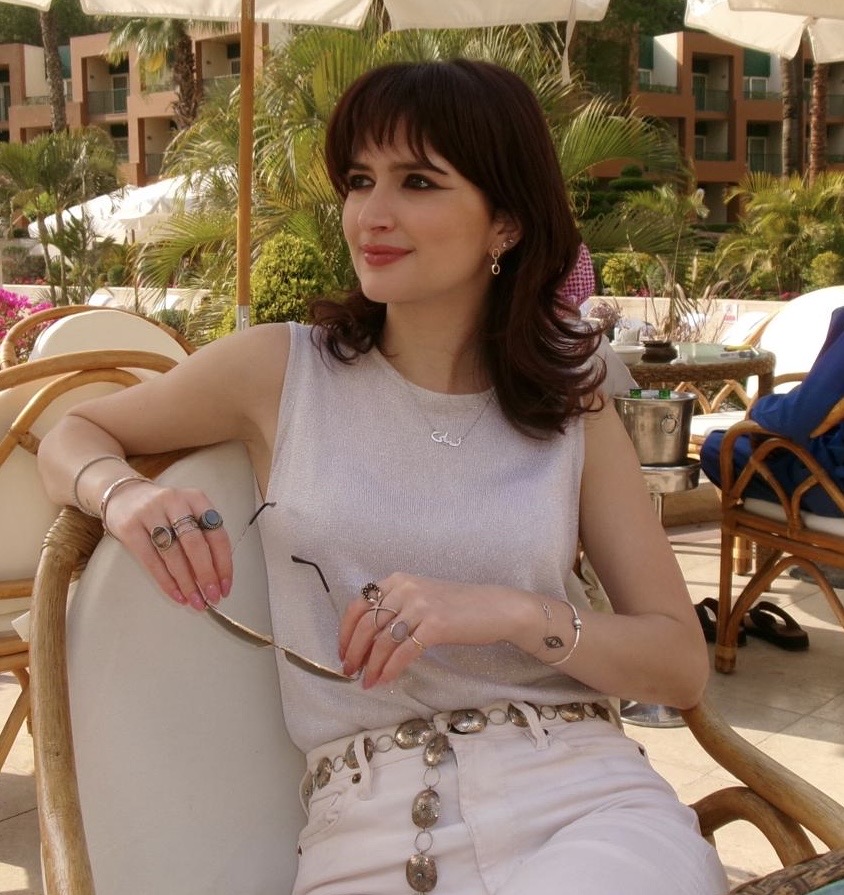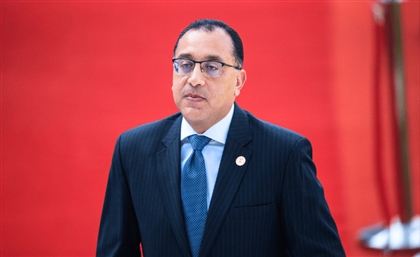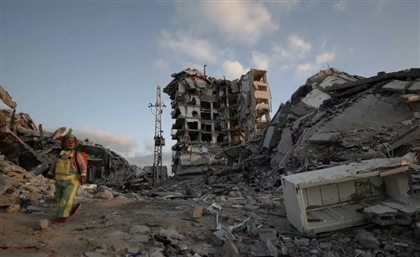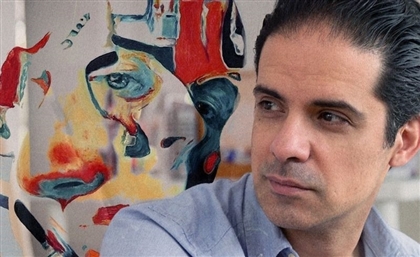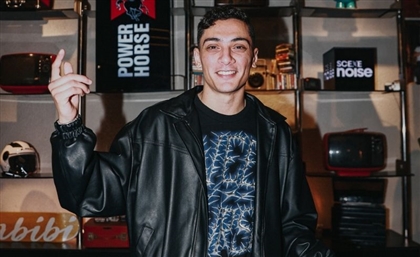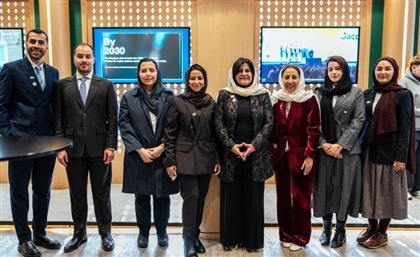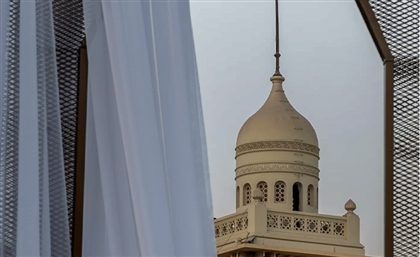Gazans in Cairo Create Livelihoods Beyond Donations With SafeGrow
SafeGrow is the organization supporting Gazan refugees displaced in Egypt find freelance work, rebuild businesses that have been destroyed, and start new ones.
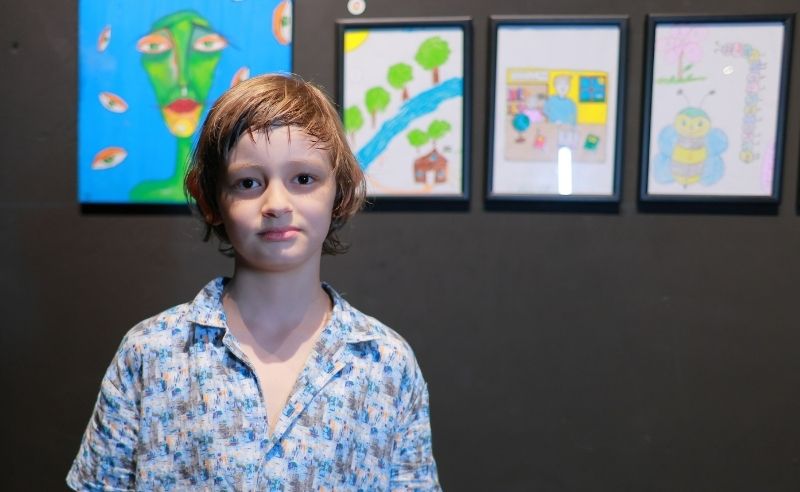
“At first, we thought that we would return to Gaza. But we’re still here,” Palestinian business owner Ola said. “When our savings ran out, we opened this business hoping it would succeed, and so we wouldn’t have to live in constant fear of our situation.”
Ola’s Tatreez-embroidered clothing store, Folklore, is one of 11 businesses that operate with the help of SafeGrow—an organisation empowering Gazan refugees with a sustainable income as temporary displacement in Cairo extends from months to years.
“We wanted a sustainable solution that gave people hope, autonomy, and something to work for again,” SafeGrow co-founder Arielle El-Bagory said. “After not being able to protect their children for so long, they should have a chance now to do that now themselves.”
Through SafeGrow, El-Bagory and co-founder Roaa Kashef have served over 1,000 families since the escalated genocide began two years ago. They started by helping families in 2023 with cash aid, but quickly realized it was an unsustainable model of support that left people dependent on outside donations to pay for basic necessities like rent. Nearly one year ago, SafeGrow became an official organization, and transitioned to focusing on providing tools, not cash through three specialized programs: SafeBuild for new businesses, SafeConnect for freelance work, and SafeRevive to rebuild existing businesses that have been destroyed in Gaza.
They provide individuals with the tools they need to start a business, like a sewing machine, laptop, or workshop equipment.
These are some of their stories.
Ola, Folklore 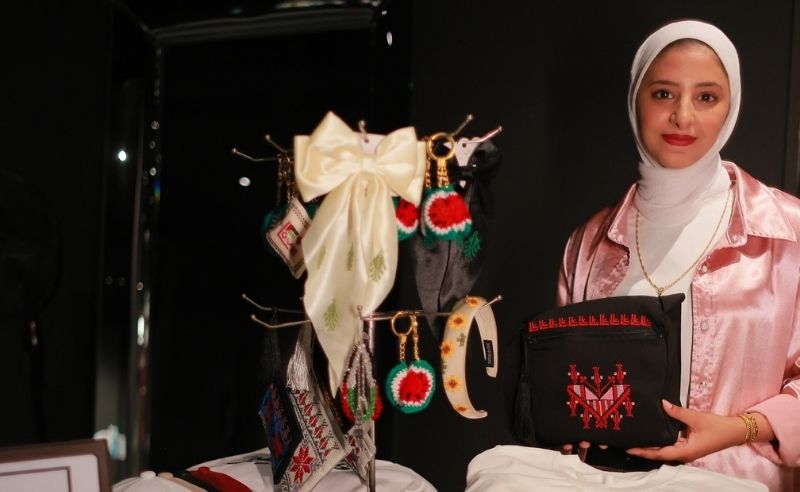 Ola remained in Gaza for seven months after October 7th before evacuating through the Rafah Border Crossing to Egypt. She was a lawyer in Gaza with a master’s in international law. But when her degree wasn’t recognized here, Ola needed to find another way to earn money. So, three months ago, she started Folklore.
“SafeGrow found us on social media and they loved our work,” she said. They reached out to Ola and offered tools to help them expand their operations and gain visibility. The Tamara Haus exhibition in Downtown Cairo was Folklore’s first, alongside other SafeGrow businesses.
Ola showed me her carefully embroidered sweatshirts, t-shirts, and bags. My favourite was the black t-shirt with a Palestine-shaped watermelon, a symbol that became famous during the First Intifada (1987-1993) when the Palestinian flag was banned by Israeli authorities in the Occupied Territories. Instead, protestors carried the watermelon.
Operations go beyond supporting Ola and her family, the business employs a whole community of Gazan women and, with the help of SafeGrow, hopes to bring in more.
The first business that SafeGrow backed was a furniture store in Gaza. Bilal and his brother ran it together with 30 employees, a production facility, and a showroom. They were so popular that they had a waitlist during the busiest seasons for their custom pieces.
Bilal, Rawa’a Carpentry
Ola remained in Gaza for seven months after October 7th before evacuating through the Rafah Border Crossing to Egypt. She was a lawyer in Gaza with a master’s in international law. But when her degree wasn’t recognized here, Ola needed to find another way to earn money. So, three months ago, she started Folklore.
“SafeGrow found us on social media and they loved our work,” she said. They reached out to Ola and offered tools to help them expand their operations and gain visibility. The Tamara Haus exhibition in Downtown Cairo was Folklore’s first, alongside other SafeGrow businesses.
Ola showed me her carefully embroidered sweatshirts, t-shirts, and bags. My favourite was the black t-shirt with a Palestine-shaped watermelon, a symbol that became famous during the First Intifada (1987-1993) when the Palestinian flag was banned by Israeli authorities in the Occupied Territories. Instead, protestors carried the watermelon.
Operations go beyond supporting Ola and her family, the business employs a whole community of Gazan women and, with the help of SafeGrow, hopes to bring in more.
The first business that SafeGrow backed was a furniture store in Gaza. Bilal and his brother ran it together with 30 employees, a production facility, and a showroom. They were so popular that they had a waitlist during the busiest seasons for their custom pieces.
Bilal, Rawa’a Carpentry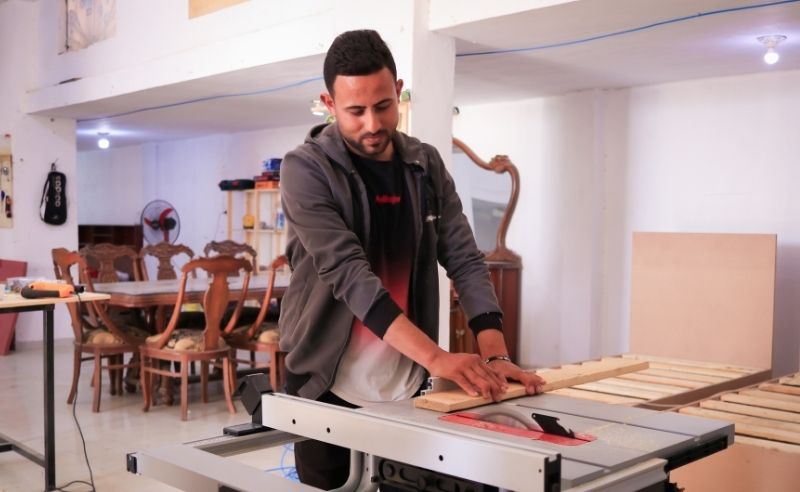 Four months after October 7th, Bilal was resting at a friend’s home in Gaza when Israeli forces struck. Stuck underneath the rubble, Bilal became the only survivor of the 23 people in that building. Among the dead were his sister-in-law and brother-in-law. Doctors put him into a coma. After he gained back some of his strength, some members of the SafeGrow team helped evacuate him, his wife and his infant daughter to Cairo, who was born just days before October 7th.
In Egypt, Bilal immediately got to work rebuilding his furniture business: Rawa’a Carpentry. SafeGrow helped him find a workshop space, provided the basic machinery, and covered his first few months of rent. Now, he is fully independent and has hired someone else, also displaced in Cairo from Palestine, to help run the enterprise.
“We visit his home and he's laughing with his daughter,” El Bagory said. “He has some joy back again.”
Recently, Bilal and SafeGrow graphic designer Layla have collaborated—Bilal making square wooden canvases on which Layla paints Al-Aqsa, Palestine, and words like ‘freedom’ in bright colors. Layla, who left Gaza when she was pregnant, is originally an artist. She had been trying to find a way to paint again.
“This collaboration is one of our favourites, seeing Bilal succeed and then do this collab with Layla,” co-founder Kashef said. “They are making incredible pieces.”
Abdelrahman, Zain Spice Store
Four months after October 7th, Bilal was resting at a friend’s home in Gaza when Israeli forces struck. Stuck underneath the rubble, Bilal became the only survivor of the 23 people in that building. Among the dead were his sister-in-law and brother-in-law. Doctors put him into a coma. After he gained back some of his strength, some members of the SafeGrow team helped evacuate him, his wife and his infant daughter to Cairo, who was born just days before October 7th.
In Egypt, Bilal immediately got to work rebuilding his furniture business: Rawa’a Carpentry. SafeGrow helped him find a workshop space, provided the basic machinery, and covered his first few months of rent. Now, he is fully independent and has hired someone else, also displaced in Cairo from Palestine, to help run the enterprise.
“We visit his home and he's laughing with his daughter,” El Bagory said. “He has some joy back again.”
Recently, Bilal and SafeGrow graphic designer Layla have collaborated—Bilal making square wooden canvases on which Layla paints Al-Aqsa, Palestine, and words like ‘freedom’ in bright colors. Layla, who left Gaza when she was pregnant, is originally an artist. She had been trying to find a way to paint again.
“This collaboration is one of our favourites, seeing Bilal succeed and then do this collab with Layla,” co-founder Kashef said. “They are making incredible pieces.”
Abdelrahman, Zain Spice Store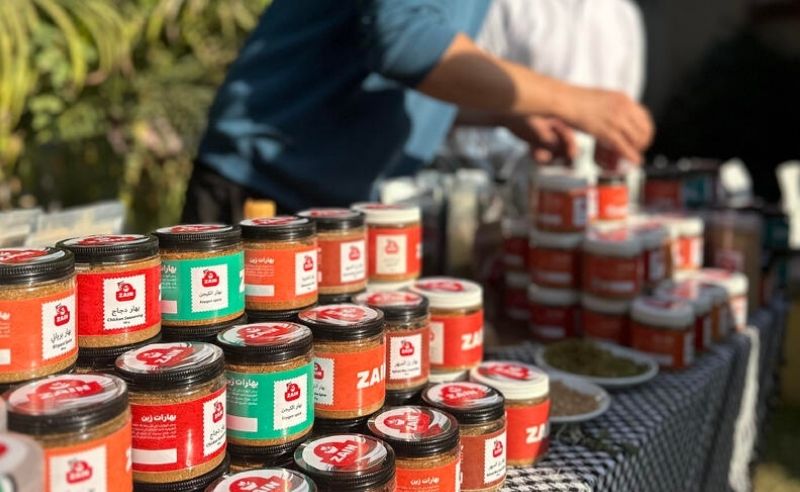 In Gaza, Abdelrahman owned a factory that manufactured car batteries and solar energy.
“We were in Gaza until the last breath,” he said. Abdelrahman lost his father, four siblings, their children, his home and his company to Israeli bombs.
“Praise be to God, we reached this result,” he said, turning towards a carefully organised and packaged display of spices. “Products that represent Palestinian identity and remind us of the past.”
Zain, named after his son, is Abdelrahman’s spice store, where he sells 58 different products rooted in Palestinian soil. SafeGrow funded Zain with a roasting machine and a 10-kilogram grinder to produce and enhance his spice blends. Among the varieties are Gazawi Dukka, paprika and cajun, as well as Zain-specific creations like Thai Spice, Healthy Indomie, and chicken seasoning.
He held a small spoon to my nose to smell, and then taste, his Za’atar—the uniquely Levantine herb mixed with sumac, sesame seeds, and salt. My eyes opened wide. I wanted to eat the entire jar in one sitting.
“A taste of Gaza,” he smiled.
Abdelrahman found me before I left. “A gift for you,” he handed me a black plastic bag. I tried to pay him, but to no avail. He wouldn’t even look at the cash in my hand.
Ilham, Aser & Adam's Kitchen
In Gaza, Abdelrahman owned a factory that manufactured car batteries and solar energy.
“We were in Gaza until the last breath,” he said. Abdelrahman lost his father, four siblings, their children, his home and his company to Israeli bombs.
“Praise be to God, we reached this result,” he said, turning towards a carefully organised and packaged display of spices. “Products that represent Palestinian identity and remind us of the past.”
Zain, named after his son, is Abdelrahman’s spice store, where he sells 58 different products rooted in Palestinian soil. SafeGrow funded Zain with a roasting machine and a 10-kilogram grinder to produce and enhance his spice blends. Among the varieties are Gazawi Dukka, paprika and cajun, as well as Zain-specific creations like Thai Spice, Healthy Indomie, and chicken seasoning.
He held a small spoon to my nose to smell, and then taste, his Za’atar—the uniquely Levantine herb mixed with sumac, sesame seeds, and salt. My eyes opened wide. I wanted to eat the entire jar in one sitting.
“A taste of Gaza,” he smiled.
Abdelrahman found me before I left. “A gift for you,” he handed me a black plastic bag. I tried to pay him, but to no avail. He wouldn’t even look at the cash in my hand.
Ilham, Aser & Adam's Kitchen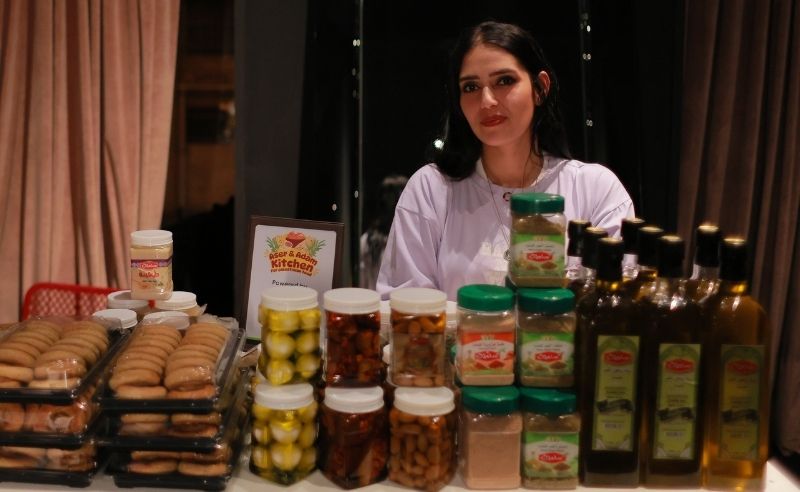 Ilham also named her business, Aser and Adam’s kitchen, after her children. The family of four—Ilham, her husband, and two sons—have been in Egypt for a year and a half. They are originally from Tel al-Hawa, a neighborhood in southern Gaza City.
Ilham handed out samples of her ma’amoul, my favorite date-stuffed dessert.
“I get the olive oil and za’atar from the West Bank, but I make the rest myself,” she said.
Makdous, ma’amoul, ka’ak, and labne sat in rows of jars stacked atop each other. She also makes traditional Gazan meals like grape leaves, musakhan, and maqluba on order.
“We are trying, you know? We are trying. Little by little.”
Shireen, Shireen Gaza Boutique
Ilham also named her business, Aser and Adam’s kitchen, after her children. The family of four—Ilham, her husband, and two sons—have been in Egypt for a year and a half. They are originally from Tel al-Hawa, a neighborhood in southern Gaza City.
Ilham handed out samples of her ma’amoul, my favorite date-stuffed dessert.
“I get the olive oil and za’atar from the West Bank, but I make the rest myself,” she said.
Makdous, ma’amoul, ka’ak, and labne sat in rows of jars stacked atop each other. She also makes traditional Gazan meals like grape leaves, musakhan, and maqluba on order.
“We are trying, you know? We are trying. Little by little.”
Shireen, Shireen Gaza Boutique 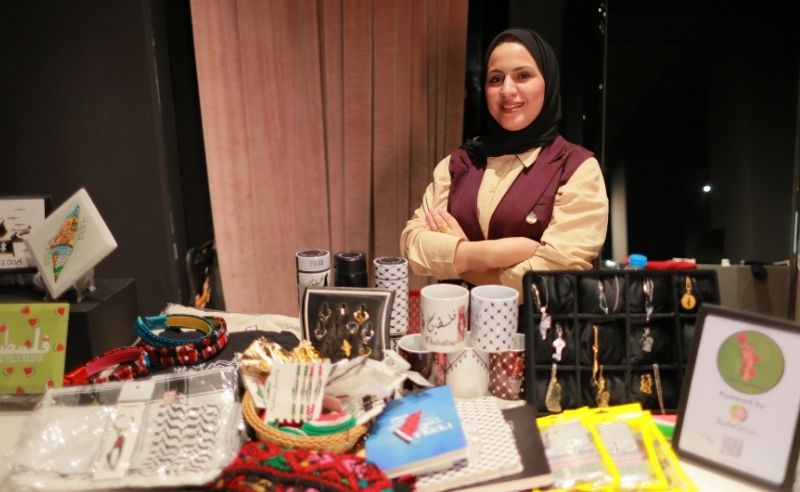 For 23-year-old Shireen, starting a business allowed her to pay rent, her daughter’s school fees, and household expenses in Cairo. Originally from Jabalia, she has been in Egypt with her husband and two children for over a year.
“I decided to launch this brand because we must depend on ourselves,” she said. “We need to build something for our future and our children's future.”
Shireen Gaza Boutique carries custom Keffiyeh phonecases, Palestine waterbottles, and silver rings, one of which I wear daily now. Handala appears on many of Shireen’s designs, Palestinian artist Naji al-Ali’s cartoon character of a barefoot 10-year-old refugee boy with his hands crossed behind his back. Based on his experience as a child refugee, the child’s back is turned to the audience to symbolize how the world has turned theirs on the Palestinian people. Handala is a well-known symbol of resistance and steadfastness in the face of Zionist oppression.
Her business would not be possible without SafeGrow, she said.
“I want to thank SafeGrow for welcoming me into their community and for supporting my project,” Shireen said. “From the bottom of my heart.”
Amena, Cooking Lessons
Amena began her culinary journey with her brother three years ago in Jerusalem. She moved to Gaza when she got married, but had grown up in the Holy City. So every time she came home to visit, she would cook the dishes she had learned in Gaza for her family.
She used her Instagram to document her gastronomic excellence and tender moments with her first-grade students.
When the genocide started, however, Amena could no longer find the ingredients for her favorite meals of waraq enab and koussa.
"We invented new dishes during the genocide,” she said. “We managed with the simplest resources."
Amena found a way to prepare traditional Palestinian dishes like maqblouba, mujaddara, and muttabal with whatever was available. In Gaza today, she clarified, that this would no longer be possible.
“After the first two months of the genocide, I left Gaza for Jerusalem and continued cooking with my brother to regain myself and heal,” she said, “while at the same time hiding my anxiety about my husband, who remained in Gaza.”
Amena met her husband in Egypt a few months later, where she has continued teaching young Gazan students who have no other options for formal education in Egypt. She has also continued cooking, holding lessons for foreigners and Arabs alike that SafeGrow has helped facilitate by providing the necessary kitchen supplies. SafeGrow is looking forward to helping Amena develop her marketing and build her business in the coming months.
SafeGrow supports more Gaza-owned businesses like Marmar Store and Torathna Stitch, which embroider Palestinian Tatreez designs. The former sells accessories like necklace pendants and hair bows, while the latter stitches vests, scarves, and t-shirts with Arabic phrases front and center such as “حتى الآن الورد يقاوم”—The roses still resist. Elma Store for clothing and Mouvel Story for personalised fairy tales cater to parents and their children. Elma Store imports high-quality children’s attire from Turkey, everything from matching Mickey Mouse sets and varsity jackets to sharp linen button-ups and pink shorts. Mouvel Story is a mother-daughter run business that personalises fairy tales in Arabic and English with a child’s photo, name, and favorite activities.
These are only a fraction of the stories of Gazans who have fled from genocide to Egypt, rebuilding their lives from scratch in a foreign country. If you are looking for a way to get involved, you can reach out to SafeGrow through their website or Instagram to help them sponsor new businesses or purchase from vendors directly.
For 23-year-old Shireen, starting a business allowed her to pay rent, her daughter’s school fees, and household expenses in Cairo. Originally from Jabalia, she has been in Egypt with her husband and two children for over a year.
“I decided to launch this brand because we must depend on ourselves,” she said. “We need to build something for our future and our children's future.”
Shireen Gaza Boutique carries custom Keffiyeh phonecases, Palestine waterbottles, and silver rings, one of which I wear daily now. Handala appears on many of Shireen’s designs, Palestinian artist Naji al-Ali’s cartoon character of a barefoot 10-year-old refugee boy with his hands crossed behind his back. Based on his experience as a child refugee, the child’s back is turned to the audience to symbolize how the world has turned theirs on the Palestinian people. Handala is a well-known symbol of resistance and steadfastness in the face of Zionist oppression.
Her business would not be possible without SafeGrow, she said.
“I want to thank SafeGrow for welcoming me into their community and for supporting my project,” Shireen said. “From the bottom of my heart.”
Amena, Cooking Lessons
Amena began her culinary journey with her brother three years ago in Jerusalem. She moved to Gaza when she got married, but had grown up in the Holy City. So every time she came home to visit, she would cook the dishes she had learned in Gaza for her family.
She used her Instagram to document her gastronomic excellence and tender moments with her first-grade students.
When the genocide started, however, Amena could no longer find the ingredients for her favorite meals of waraq enab and koussa.
"We invented new dishes during the genocide,” she said. “We managed with the simplest resources."
Amena found a way to prepare traditional Palestinian dishes like maqblouba, mujaddara, and muttabal with whatever was available. In Gaza today, she clarified, that this would no longer be possible.
“After the first two months of the genocide, I left Gaza for Jerusalem and continued cooking with my brother to regain myself and heal,” she said, “while at the same time hiding my anxiety about my husband, who remained in Gaza.”
Amena met her husband in Egypt a few months later, where she has continued teaching young Gazan students who have no other options for formal education in Egypt. She has also continued cooking, holding lessons for foreigners and Arabs alike that SafeGrow has helped facilitate by providing the necessary kitchen supplies. SafeGrow is looking forward to helping Amena develop her marketing and build her business in the coming months.
SafeGrow supports more Gaza-owned businesses like Marmar Store and Torathna Stitch, which embroider Palestinian Tatreez designs. The former sells accessories like necklace pendants and hair bows, while the latter stitches vests, scarves, and t-shirts with Arabic phrases front and center such as “حتى الآن الورد يقاوم”—The roses still resist. Elma Store for clothing and Mouvel Story for personalised fairy tales cater to parents and their children. Elma Store imports high-quality children’s attire from Turkey, everything from matching Mickey Mouse sets and varsity jackets to sharp linen button-ups and pink shorts. Mouvel Story is a mother-daughter run business that personalises fairy tales in Arabic and English with a child’s photo, name, and favorite activities.
These are only a fraction of the stories of Gazans who have fled from genocide to Egypt, rebuilding their lives from scratch in a foreign country. If you are looking for a way to get involved, you can reach out to SafeGrow through their website or Instagram to help them sponsor new businesses or purchase from vendors directly.
- Previous Article Alexandria Turns Into an Open-Air Gallery for Contemporary Art Days
- Next Article Inside Egypt’s Seven UNESCO World Heritage Sites
Trending This Week
-
Feb 16, 2026







